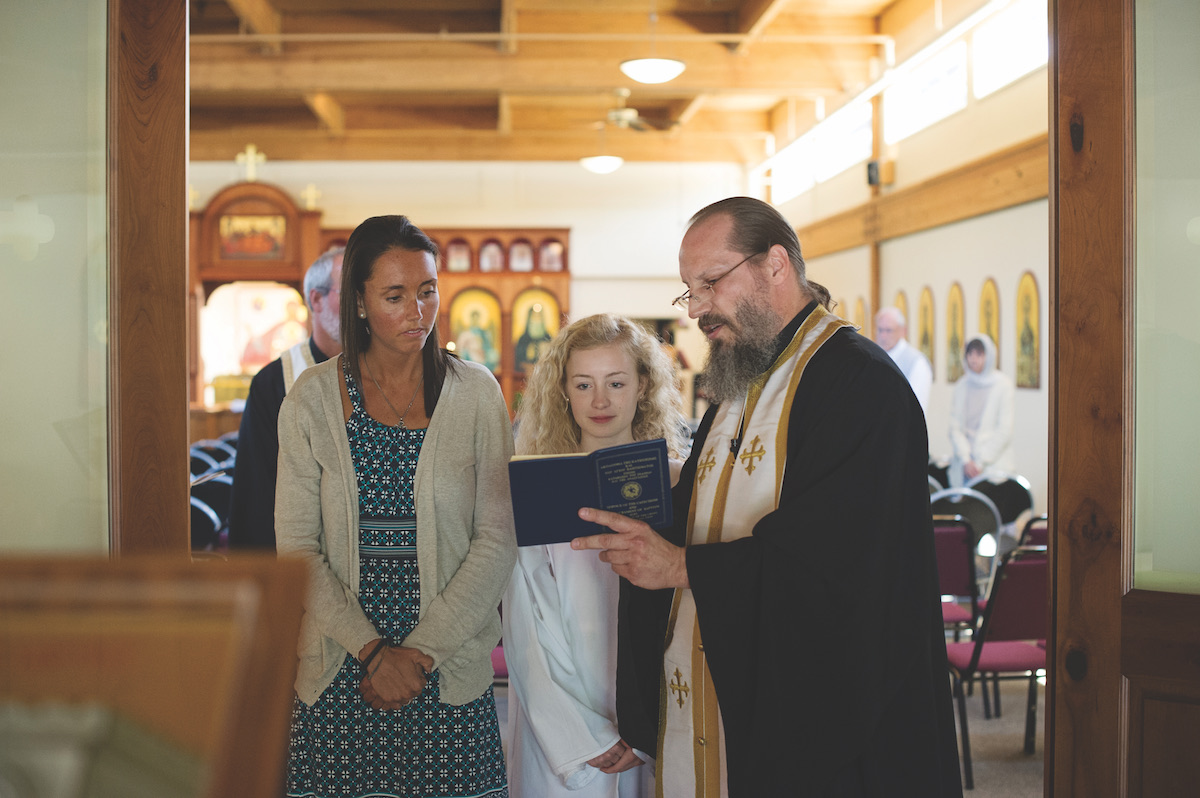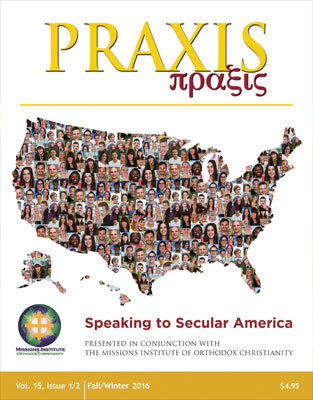This article is from PRAXIS 2016 Volume 15 Issue 1/2: "Speaking to Secular America" (Fall/Winter 2016).
Thank you for the opportunity to be back at Holy Cross, a wonderful part of my life and Christian formation. I feel honored and privileged to be a part of the life of the school, a part of the inauguration of our new president, Fr. Chris Metropoulos, who I have known for many years, and a part of this esteemed group of speakers. As a simple parish priest, I stand before you humbled by this opportunity. I do not have a perfect parish, and I certainly am not a priest who has all the answers. Any thoughts I present are meant to be constructive and aimed at encouraging us all to more fully live out the missionary and evangelical theology of our Church. I hope that my thoughts may contribute to this important discussion of recognizing the United States as a mission field and facing the reality that we are in a post-Christian age and immersed in an increasingly secular society.
Recently, the Pew Research Center came out with a new study—one of a comprehensive series—looking at the religious landscape of our country. To me, the most interesting information coming from this study was that people are becoming increasingly non-religious. The fastest growing segment of our population, religiously speaking, are those who no longer consider themselves to be affiliated with a religion. To put it bluntly, people are leaving the churches of their parents and grandparents. They are no longer associating themselves with any specific faith tradition.
I’m not sure we need to be dependent upon national studies to realize that our nation is drifting away from God. I’m from Portland, Oregon, and we in the Northwest, and specifically in Portland have been living this reality for some time. Oregon has long been ranked as one of the most unchurched states in the country, and Portland, one of the most secular cities in America. Neopaganism is alive and well in Portland. Our state is a leader in driving values and laws that stand in the face of God’s commandments and the teaching of the Orthodox Christian Church. All of this secularism is certainly not unique to the Northwest. This cultural shift away from God is, increasingly, a national phenomenon. For sure, there are some who are hostile to Christianity and to Christians, just look at the shooting in Roseburg, Oregon, where Christians were specifically targeted. But, there are still many who are non-religious yet not hostile toward Christianity. Many non-religious are still seeking truth. They are searching for an “authentic experience” of God. Many of those who have left “organized religion” are not atheists; they may be confused about what they believe, or they might even consider themselves still Christian but done with churches. In Portland, we often hear the statement: “I’m spiritual but not religious.”
The Inoculation Effect
It’s true that people are leaving churches at an unprecedented rate, but we, the Orthodox Christian Church here in America, need to see this as an opportunity! People are created in the image of God; therefore, they are by nature, worshipping creatures. Their hearts, because they are created very good, are naturally inclined toward the truth. They may be currently unattached, with no church affiliation, but we need to remember this: most of them were never Orthodox! They have probably never experienced the fullness of truth or an authentic experience of heavenly worship. These people are a part of the great harvest of which our Lord speaks. They have gone to church, been a part of “organized religion” and have found it wanting. They have been spiritually inoculated, meaning they have had just enough of partial truth, just enough of a bad witness of Christianity or “organized religion” to reject it, which makes them ripe for the One, Holy, Catholic and Apostolic Church!
In order for people to accept true, apostolic Christianity, they have to reject the half-baked pseudo Christianity that they’ve been exposed to. Similarly, if we are going to have churches that effectively reach out to this growing segment of our country’s population, we cannot offer them watered-down Orthodoxy. We have to make sure that our Church and our parishes are the best reflection and expression of the Apostolic truth, faith and life that has been passed down by every generation of Orthodox since the Apostles.
Personal Background
Something from my personal background is of relative importance in this conversation: I was born into a Roman Catholic family and then dabbled in the Evangelical Protestant faith tradition during my early college years before I discovered the Orthodox Church. I can still remember vividly my astonishment of being absolutely ignorant of the One, Holy, Catholic and Apostolic Christian Church for the first nineteen years of my life! The realization that it took me so long to discover the “best kept secret,” and that so many people just like me were looking for the Truth but can’t find it, has stayed with me and shaped my entire priestly ministry.
My first two parish assignments were large parishes: 1,200 families served by three priests, and then 400 families on my own. With both parishes, I was so focused on the needs of my many parishioners that I felt like I was neglecting the thousands all around me who were just like me before I found the Orthodox Church. The burning question throughout my ministry was and still is, “How are we going to share this ancient and saving Faith of the Apostles with the non-Orthodox around us?”
It was this burning desire within me that motivated me to volunteer to start a new parish from scratch. It started as a strategy of the metropolis, rather than as a break-off from an existing parish or a response to an existing group of people. The new parish started with six families. Unlike most start-up parish situations, I was assigned as the full-time priest right away. By the grace of God and the financial commitment and generosity of the founding families, the parish was never subsidized by any outside sources. From the very beginning until the present day, the entire operating budget of the parish has been sustained by the members’ commitment to stewardship. The parish has now grown to nearly 150 families and supports one full-time priest, one part-time priest and a parish administrator, with a budget of almost half a million dollars based entirely on stewardship. The overwhelming percentage of growth has come from people either converting to the Orthodox Church with no previous connection to Orthodoxy or from people who had fallen away from Orthodoxy and came back.
Throughout my almost twenty-five years of ministry, I have never forgotten the sense within me that I had discovered the fullness of truth: the One, Holy, Catholic and Apostolic Church. One of the statements from my reading early on in my young adult search for truth that literally blew me away was that the Orthodox Church had an unbroken continuity of biblical interpretation, doctrinal belief, liturgical worship and succession of ordination from the present day all the way back to Christ and the Apostles. To me at the time, this was an incredible statement: either it was the most presumptuous statement or it was true. For the next year, I studied Church history to either prove it wrong or verify it, and I am standing here right now as an Orthodox priest because I found it to be true. This Church, our Church, became known as the Orthodox Church for a reason. Orthodox means “right belief,” because everything Christ is, everything He did and all that He taught is contained in its entirety in the Orthodox Church, and the Holy Spirit keeps this truth whole and intact from generation to generation.
An Evangelical Mindset
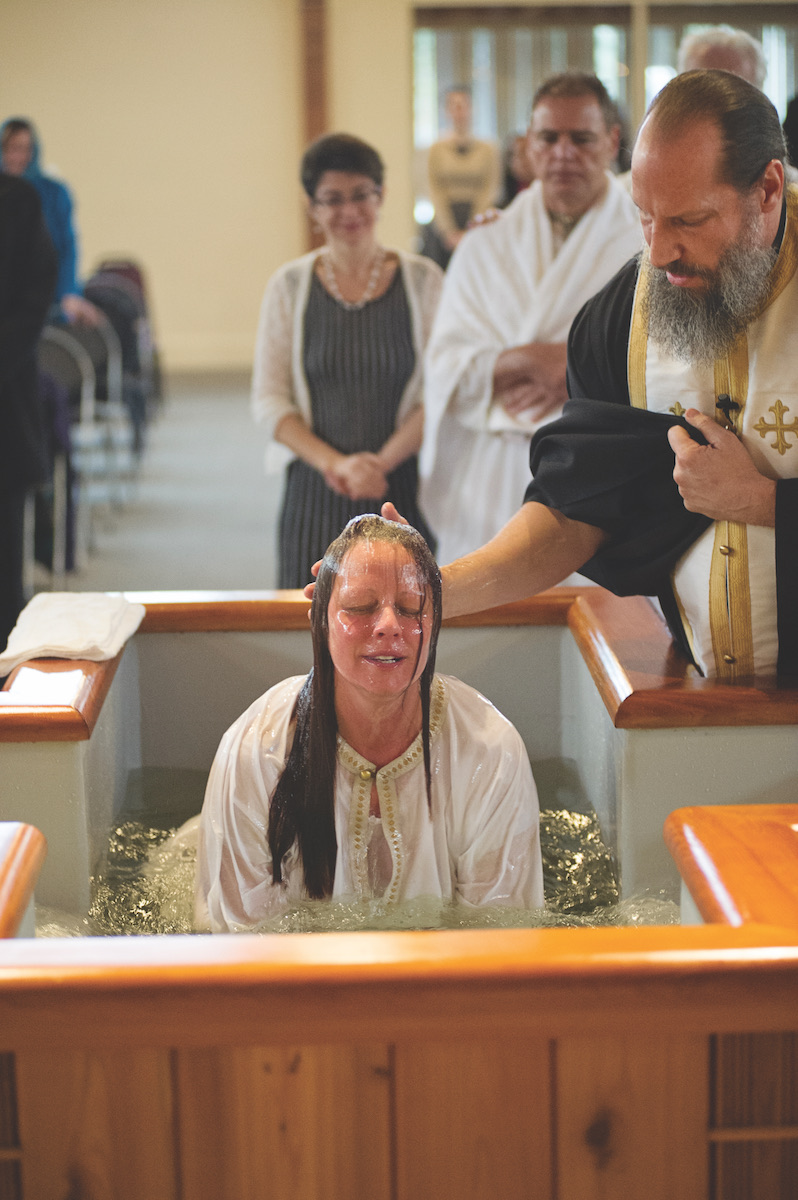
Do we believe this, not as intellectual truth, but in the way we live, in how we act and go about expressing ourselves as a Church with humility, but also with a burning love for those drowning around us in the ocean of confusion, falsehood and partial truths while we sit within the “Ark of Salvation”?
Christ has revealed Himself to us as the Bridegroom. The whole story of salvation history is Christ the Bridegroom in pursuit of His beloved. His love for every human being He has created is so unquenchable and unfathomable that He completely emptied Himself and condescended to such a degree that He became a man. His entire life was an expression of selfsacrificial love, culminating in His willing ascent on the cross. Through His horrible death upon the cross, Jesus Christ wed Himself to humanity and consummated this ultimate marriage between Himself and us. And when I say us, I don’t simply mean the Orthodox Christians; I mean every single human being from Adam to the last person conceived before the end. The Apostle Peter affirms this when he says that the Lord does not wish that “any should perish, but that all should reach repentance” (2 Peter 3:9). This is the love of God for every single human being and the whole world. Our Lord said, “The harvest truly is great, but the laborers are few” (Luke 10:2). He commanded His disciples to pray for the harvest and for laborers to go out and reap that harvest. God wants our hearts to burn like His with the same love for those around us and throughout the world. This was true in the first century and it is still true today.
One of the most important characteristics of the first-century Church that needs to be renewed in the twenty-first century is this burning love on the part of Orthodox Christians for those outside the Church. The Apostles and their successors, precisely because they had this burning love of Christ within them for nonbelievers, had a profound and lasting impact on the Roman Empire and beyond in just a couple of generations. The Apostle Paul, for example, stated that he was even willing to forfeit his own salvation for the sake of his fellow Jews (Romans 9).
We too are called to grow closer to Christ and partake of His divine nature that we may also participate in His love for the whole world. This God-like love has certain characteristics that are enumerated clearly in 1 Corinthians 13. Among these characteristics, St. Paul says “love does not seek its own.” Love is always about the good of the other. A Church filled with people who are growing closer to Christ is a Church that is burning with the love of God for the people all around them and for the whole world. The temptation for parish communities is to seek homogeneity, to find a comfort zone where the membership feels safe and things stay familiar. This results in “seeking our own” rather than turning our parishes inside out and “going out” with our faith and our witness in a loving but uncompromising way.
Although the Church is not of this world, it is also not a ghetto that only focuses on itself and stays in its own comfort zone. The Church engages the world and confronts society as the salt of the earth and the light of the world. For this to occur, the Orthodox Church and its members need to be visibly working to comfort the afflicted, clothe the naked, feed the hungry and minister to the sick. We cannot reach the souls of the people all around us if we neglect their physical, emotional and psychological needs.
A Church burning with the love of Christ practices the same spirit of self-denial that we as individual Orthodox Christians are called to practice, always for the sake of our relationship with Christ and for the salvation of those around us. The greater Church, each parish and each individual Orthodox Christian must be constantly asking two questions: “What am I doing to grow closer to Christ?” and “What am I doing to bring the Good News of salvation to those who don’t know it yet?” This is clearly summed up by the two greatest commandments: Love God with all your heart, mind and soul, and love your neighbor as yourself.
The Orthodox Church is the fullness of truth moving through time in a dynamic but uncompromising way. She is the One, Holy, Catholic and Apostolic Church. This means that there is no other religion, no other Christian faith tradition that is her equal. She is Catholic, because she contains the entirety, the fullness of truth about God and everything needed for salvation. When we believe this in an active, intentional way, with humility not triumphalism, then this conviction necessarily translates into a missionary and evangelistic mindset. This was the mindset of the Apostles and of every saint through the ages, and it needs to be our mindset if we are going to be a Church that effectively reaches out and welcomes the non-religious.
My dear brothers and sisters in Christ, our American society is not standing still. It is constantly changing, in fact, moving at an exponential speed away from God. This requires a response of love from us as Orthodox Christians. We have built up the Church and firmly established her here on this soil, now we need to become even more serious about “going out” with the Gospel, with this beautiful, life-giving message of salvation to our family members, our neighbors, our coworkers and everyone who crosses our path.
Remember! The non-religious of America have already been exposed to and rejected a watered-down version of Christianity. Matthew Gallatin wrote a book entitled Thirsting for God in a Land of Shallow Wells. This title aptly describes the current religious landscape of our country. If we are going to have anything to offer contemporary America, it must be the best and fullest expression of Orthodoxy! And we can’t wait around until we are holy; we need to begin right now!
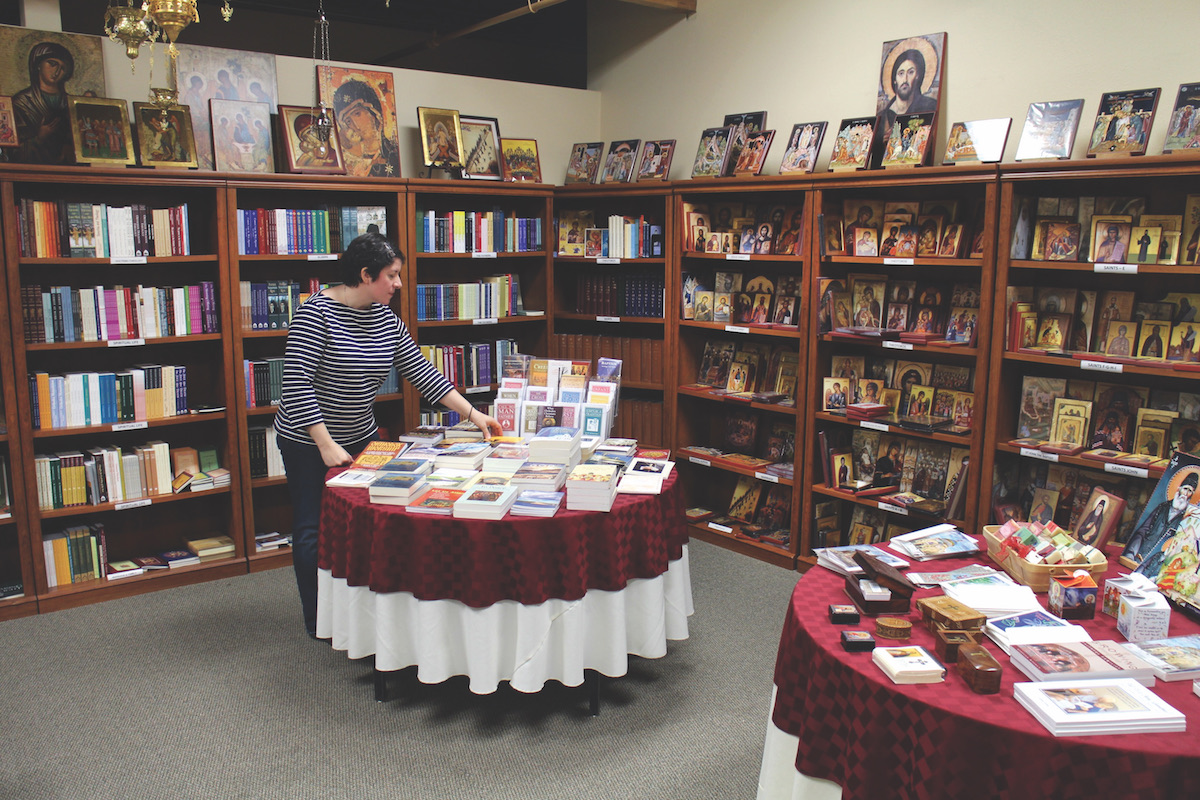
Parish Life
So what does this mean for our Orthodox Church in the twenty-first century? So much could be talked about, but because of time constraints, I have chosen to focus on just three aspects of parish life that are essential to effectively reach out to the non-religious.
First, a Church that welcomes the non-religious must be a Church that continually strives to be better at teaching, preaching and inspiring our people to know and live deeply their faith. This is of vital importance. We cannot offer to others what we do not have ourselves. The clergy have the responsibility to be lifelong learners and lifelong practitioners of the Faith. We have to keep growing in Christ, both in terms of studying our theology and putting it into practice. Everything we expect from our parishioners we need to expect from ourselves, and to an even greater degree. The Apostle Paul asks the pointed question: “You who teach another, do you not teach yourself ?” (Romans 2:21). Our preaching and our teaching should be clothed in humility and be the fruit of our own study and struggle to live what we preach. As clergy, whenever we preach or teach, we should try to do the very best we can and utilize the Scriptures and the Church Fathers as much as we are able. Our goal should be to help the faithful effectively live their faith in continuity with the saints who have come before us through the ages.
In addition to the sermons on Sundays and feasts, we should take every opportunity to explain to our people what we are doing and why we are doing it. The clergy should not be the only teachers and educators in our parishes. We need to utilize the gifts of the laity. They need to be trained, empowered and entrusted in this essential ministry, teaching and equipping our Church membership with as full an expression of the Faith as possible. We should offer catechetical classes and Bible studies open to everyone, Orthodox and non-Orthodox alike. Retreats with guest speakers should be offered several times each year in every parish.
Youth ministry is important, and we should offer the very best youth programs we can, but even more important than a shining youth ministry, we need to build up and educate our parents. The truth of the matter is that parents are our primary youth workers on a twenty-four-hour, seven-day-a-week basis. If our parents do not know their Faith, live their Faith and witness the Orthodox Faith in their homes behind closed doors, then how can we expect our children to overcome a weak witness in the face of all the enticing offerings of the world and remain lifelong Orthodox by choice. The more we build up our parents in the Faith, the more their home environment will parallel the Church. If our parents know and live their Faith, then we can have confidence that their children, our youth, will have the best chance of making the Faith their own before they leave home and transition into young adulthood.
Thriving bookstores in all our parishes is a must if we are going to be well positioned to meet the needs of today’s non-religious people. The Bible, the writings of the Fathers, the lives of the saints, and the writings of contemporary elders and theologians are all food for our souls. In the same way the body needs material nourishment, the soul also needs spiritual nourishment. In the face of the never-ending assault on our minds and hearts of noise, information and outright falsehood, we need a steady diet of truth. We need practical teaching to inspire and encourage us, as well as trustworthy lives to imitate. We cannot grow if we are not learning and putting into practice what we learn. Similarly, we will not have a convincing witness if we are not educated in our Faith. The bookstore will also be an attraction to those among the non-religious who are seeking. Our parish bookstore gets drop-in visitors all the time who have stumbled across Orthodoxy on the Internet and want someone to talk to and something more to read.
Secondly, if we are going to do better as a Church in effectively reaching out and welcoming the non-religious, we need to strive to deepen our repentance. Remember, if we are going to have the one thing needful to offer contemporary America, it must be the witness of lives being changed, healed and sanctified by Jesus Christ. This requires continual and deep repentance. The very first words that were ever preached by our Lord were “Repent, for the kingdom of heaven is at hand!” (Matthew 4:17). The goal of the Christian life is the acquisition of the Holy Spirit. If we want those outside the Church who are all around us to come and experience Jesus Christ and His Kingdom through the Orthodox Church, then we need to be the living evidence of the presence of His Kingdom! Although we have the fullness of truth, if it is not changing us, making us more Christ-like, or making us even a little bit holier and different than the world around us, then we will not have what the non-religious of the twenty-first century need.
In the first century, Andrew could tell Peter, and Philip could tell Nathaniel, “Come and see!” and they could come and actually see Jesus for themselves. Today, we say “come and see,” but people are not able to see Jesus in the flesh before them. Instead, what they will see will be our lives, our example and our witness. In a very real sense, we might be the only living Gospel for these people to see. This is a weighty responsibility but we cannot escape it. Remember the words of our Lord, “He who hears you, hears Me, and he who rejects you, rejects Me” (Luke 10:16).
Therefore we must be serious about repentance. St. John Chrysostom teaches us that repentance “opens up heaven and leads us into Paradise.” May this not only be true for us, but may our witness open up heaven for those who visit our parishes and also lead them into Paradise. Jesus taught, “Blessed are the pure in heart, for they shall see God” (Matthew 5:8). Christ calls us to purify our hearts through repentance so that His light might shine through us to those around us. This is what Christ meant when He said, “Let your light so shine before men, that they may see your good works and glorify your Father in heaven” (Matthew 5:16). In other words, we need to trust that visitors and inquirers will see the light of Christ in us if we are striving for greater purity of heart.
Thirdly, a Church that can offer living water to those who are thirsting for God in a land of shallow wells is a praying Church. The heart and soul of the Orthodox Church is her liturgical and sacramental life. We most fully manifest ourselves as the Body of Christ by partaking of the one Bread and the one Cup. On this side of life, the place par excellence where heaven and earth intersect is in the Divine Liturgy. “Blessed is the Kingdom of the Father, and of the Son, and of the Holy Spirit, now and forever, and to the ages of ages. Amen.” Every human being is created to worship because they are created in the image of God. The beauty of our church architecture and iconography, the power of liturgical music well done, the witness of an orderly, prayerful ethos, the depth of piety on the part of both the clergy and the laity, and the beauty and depth of truth revealed in the hymns, the prayers, the readings and the petitions— all of these aspects of our Orthodox worship are meant to deeply touch the heart of every human being. Remember the words of the Slavic emissaries who visited Hagia Sophia: “Whether we were in heaven or earth we do not know, but surely we know that God dwells in this place.” Through this experience of the Church at prayer, an entire nation was converted to Christianity.
We need to make sure that our parishes are not Sundayonly churches. We priests need to make sure we are offering as full a liturgical life as possible. All too often, clergy don’t schedule the services because they say the people don’t come. Rather than abandoning some of these beautiful and rich services that make up the prayer life of the Church, we must use this tremendous opportunity to educate our faithful, to encourage them, and to cultivate within them a desire for prayer and worship. A parish committed to prayer benefits even those who are unable to attend all the services.
A full liturgical life in our parishes inspires our members to pray and to a life of prayerfulness. St. Nicodemus of the Holy Mountain says this of prayer: “There is no other virtue that is either higher or more necessary than sacred prayer. Prayer joins man with God and God with man and makes the two one spirit.”
The Greater Church
Our Hierarchs
There is no way to speak about the Church and not think about the role of our bishops. The hierarchs play a central role in every aspect of Church life. As St. Ignatius of Antioch teaches, “Where the bishop is, there is the Church!” The bishop is the fullest expression of Christ’s priesthood in the Church. Nothing we do in the Church is valid apart from the canonical connection and oneness we receive by being of the same mind and in communion as clergy and laity with our bishops. Therefore, any shift in mindset toward a greater recognition of America as a mission field and toward a more central focus on missions and evangelism must not only include the bishops but also be lead by our hierarchs. We pray at every Divine Liturgy that our bishops will rightly divide the word of truth, because we know and recognize what a central and vital role they play in assuring that we live and practice the fullness of Faith we have received from those who have gone before us. To be in the line of the Apostles, as our bishops truly are, means by definition that they have been sent out to proclaim the Gospel and make disciples. May we fully support them as they lead us and guide us as missionaries and evangelists in turning our parishes inside out to reach out and welcome those who are seeking the Kingdom of heaven.
Our Seminaries
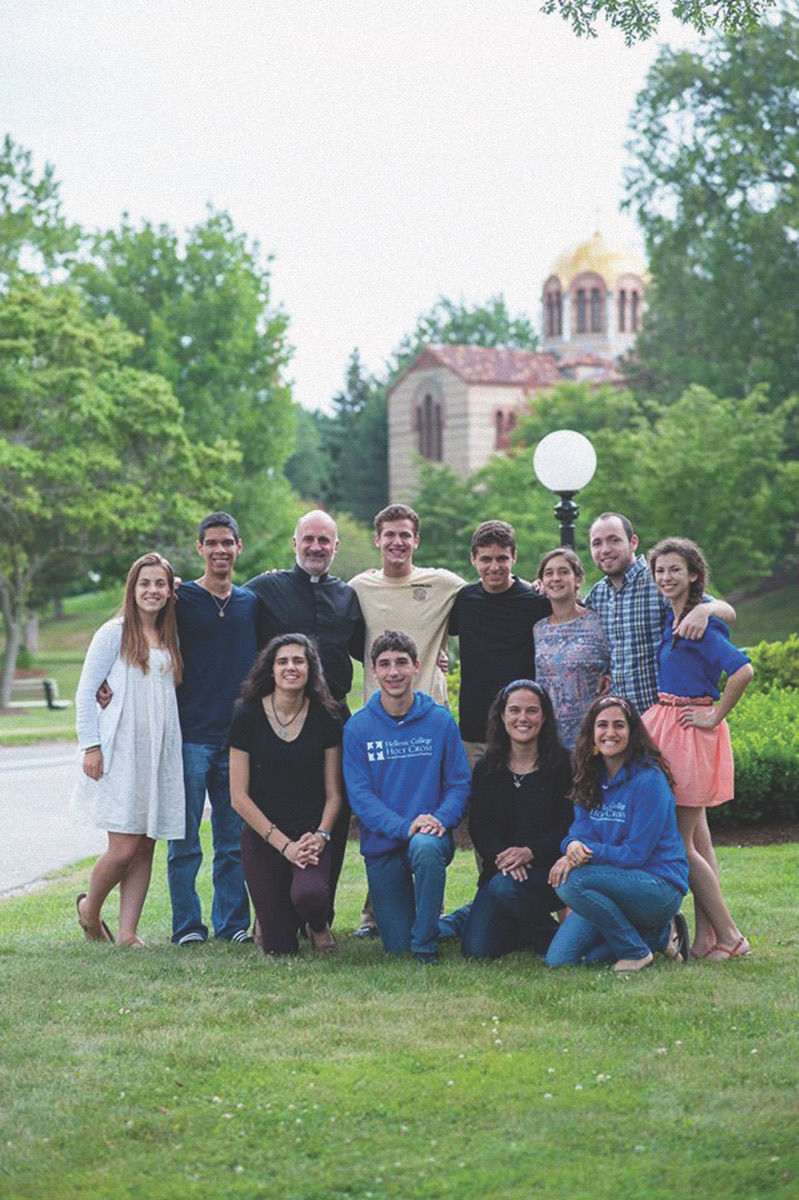
The dual institutions of Holy Cross and Hellenic College or any of our Orthodox seminaries also play a vital role in helping our Church confront our increasingly secular society. At these beautiful schools, we are preparing and helping shape the next generation of clergy and lay leaders of our Church. What an incredible opportunity for our seminaries to cultivate a missionary-mindedness and the burning love of Christ for those hungering and thirsting for truth in the hearts of these students. We are already past due to have as a part of the core curriculum of our theological schools classes on missiology and evangelism from an Orthodox point of view. We do practicums in pastoral care. We are good at training and producing maintainers and sustainers of what we already have. Now, it will be a necessity for our Orthodox seminaries to equip every future leader in how to plant new churches, revitalize shrinking parishes, reach out to the non-Orthodox and the non-religious and make new disciples. America is a mission field, and we need to begin producing domestic missionaries, as well as an increased mission-mindedness in all our priests and church leaders.
Our Metropolises
At the metropolis level, allow me to use as an example the work of the Commission for Orthodox Missions and Evangelism (COME) within the Metropolis of San Francisco as an example of how our metropolises can help our parishes more effectively reach out to the non-Orthodox. COME has a board comprised of the metropolitan, the chancellor and seven other appointed clergy and laity from around the metropolis. We have also recently hired a full-time assistant director, so we now have a full-time presence in the life of our metropolis. COME was founded back in 1991 and is responsible for helping establish more than twenty-five new parishes up and down the West Coast. With the development of our new strategic plan, COME has expanded its scope and more finely tuned some of its ongoing objectives. The three primary objectives of COME are to:
-
Establish and support a missions and evangelism ministry in every parish
-
Respond to parishes either needing or requesting mentoring in various aspects of parish life, so they can better meet their mission and vision
-
Continue to plant new parishes where needed, particularly in growing metropolitan areas
Planting New Parishes
Please allow me a few words about planting new parishes. Many believe that we can grow the Orthodox Church in a significant way by growing our already existing parishes larger. This has not and will not prove to be true. Most of the large parishes of the Greek Orthodox Archdiocese are not appreciably growing. Some are even shrinking. Studies show that when parishes reach around 80 percent of their physical capacity, growth in membership begins to slow down. In addition, larger parishes make it very difficult to fully act upon and express our sacramental theology. The sacrament of confession is the most obvious example. In our larger parishes, the parishioner-to-priest ratio is too great to practically allow for regular confession on the part of the majority of members.
If our Orthodox Church is going to effectively reach out to the non-Orthodox and grow, one way it is going to grow is by strategically and intentionally planting new parishes. The ideal parish moving forward should not be larger than 200 active families who are fully committed to Christian stewardship and the liturgical and sacramental life of the Church. The ideal priest-to-family ratio is one per 100 families. Therefore, even an active parish of 200 families can support two priests and better meet the pastoral and sacramental needs of the members.
In addition, smaller, thriving and growing parishes are more attractive to non-Orthodox seekers. They are looking for an authentic experience of community where they can be known and more intimately know others in the parish. They are also looking for greater access to the priest on a more intimate level of relationship as a mentor and spiritual guide. All these reasons point to more and smaller parishes as a strategic answer to this important topic of our conference.
There is also a myth that if we plant new parishes in a city, it will hurt the already existing parishes. In our experience in the Metropolis of San Francisco, not once has this proven true. Quite the opposite! In cities such as Phoenix, Sacramento, Seattle and Portland where we have planted new parishes, the existing parishes have grown stronger.
In conclusion, please take away with you today two essential points. First, one of the most important ways our Orthodox Church can reach out and welcome the non-religious is to offer them the witness of lives that are being changed and sanctified by participation in the life of the Church. The other point is that we need to rediscover the Church’s Apostolic identity as a mission-minded and evangelical Church. This identity is rooted in Christ’s own unquenchable love for every human being and for the whole world. We need to have His love burning inside us, compelling us to reach out to the people outside our walls. Without any compromise of our Orthodox Faith and life, we need to turn our churches inside out and go forth into our increasingly secular society and proclaim the Good News of salvation in Jesus Christ.
Rev. Fr. Theodore Dorrance is Director of COME (Commission of Missions and Evangelism) for the Metropolis of San Francisco and the pastor of St. John the Baptist Greek Orthodox Church in Beaverton, OR.
Like what you’re reading? Visit the Religious Education Department to view back issues of PRAXIS and learn how to subscribe. You may also contact the Department of Religious Education by phone at (646) 519–6300 or by email at [email protected].
